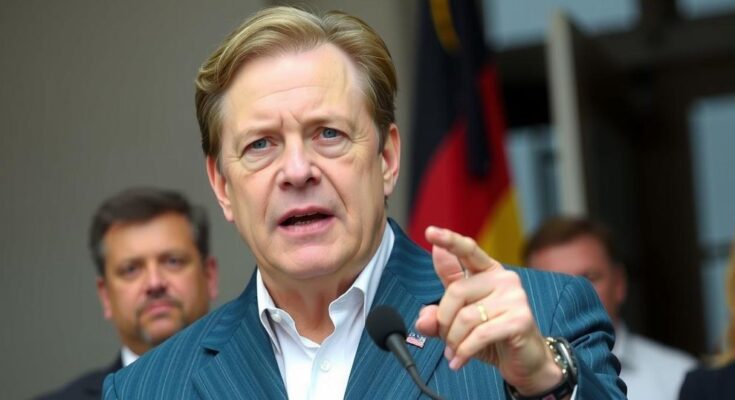The German government has sought to minimize the ramifications of Elon Musk’s endorsement of the controversial AfD party, which has drawn ire and led to an editorial resignation. As elections approach, discussions about foreign influence and political expression intensify, with government spokespersons emphasizing the party’s extremist ties while acknowledging Musk’s push to affect electoral outcomes.
On January 22, 2024, the German government reacted to Elon Musk’s endorsement of the far-right Alternative for Germany (AfD) party, aiming to mitigate concerns regarding his influence on the upcoming general elections. Musk’s opinion piece, which characterized the AfD as a beacon of hope for Germany, sparked considerable controversy, culminating in the resignation of an editor at the publication that featured his commentary. Government spokesperson Christiane Hoffmann acknowledged Musk’s attempts to sway public opinion but refrained from further comment aside from affirming the AfD’s watch status by national intelligence due to its extremist leanings.
As Germany gears up for early elections on February 23, following the collapse of Chancellor Olaf Scholz’s coalition, discussions surrounding Musk’s foreign influence intensify. The technological mogul, having invested in Germany, claimed a right to critique the nation’s trajectory. While the AfD is polling favorably, its lead candidate Alice Weidel remains unlikely to ascend to the chancellorship, given the widespread refusal among other parties to collaborate with the AfD.
The political landscape in Germany has been tumultuous, particularly with the recent collapse of the ruling coalition and the emergence of early elections. The Alternative for Germany party has gained traction, but it operates under scrutiny as it is monitored for extremist affiliations by the nation’s intelligence agencies. Musk’s involvement in the debate reflects a broader dialogue about foreign influence in domestic elections and freedom of expression, particularly through published perspectives that challenge mainstream narratives.
In conclusion, Elon Musk’s endorsement of the Alternative for Germany party raises significant concerns for the German government as it approaches an early election. The resultant political discourse not only highlights the sensitive nature of foreign commentary on domestic issues but also underscores tensions surrounding the AfD’s controversial status. As the country braces for elections, the implications of Musk’s statements and the public’s response may influence the political climate moving forward.
Original Source: www.voanews.com




